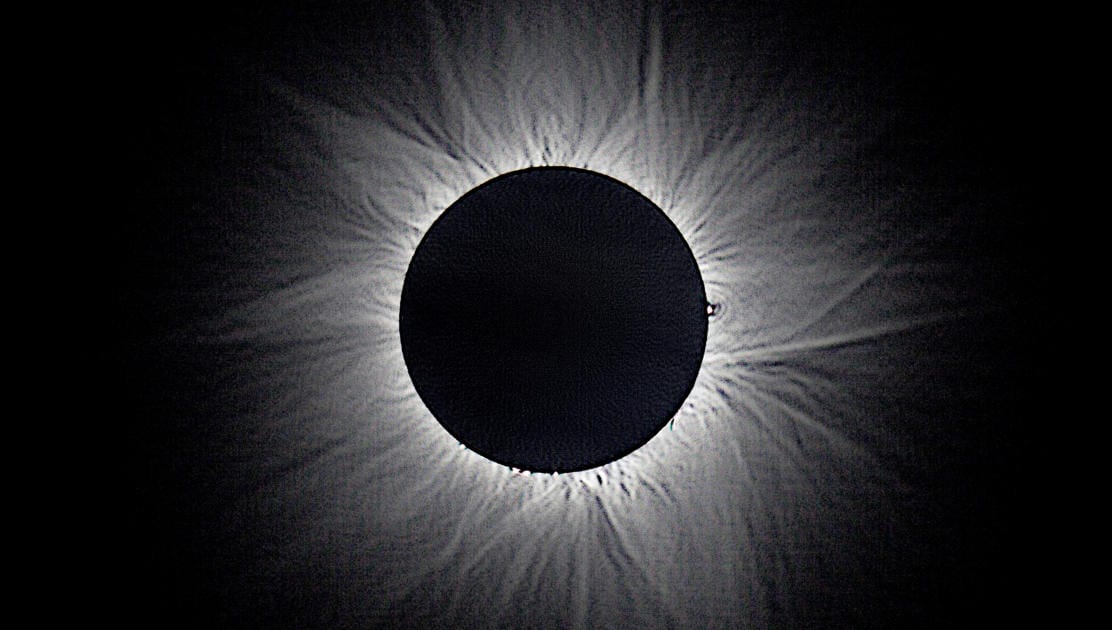Great American Eclipse… or Eclipse of America?
By Clark StrandOn August 21, 2017, parts of America will experience darkness at midday as the moon occults (or “hides”) the sun. For all the media build-up to the event, the eclipse itself won’t last for very long. Nor will the full eclipse be witnessed by most of America. Clear weather permitting, its full glory will be visible only to a 70 mile-wide swath, crossing the body of America like a sash—or, if you will, a slash.
Look at the full path of the August 21 eclipse on a map and it resembles one of those circular signs with a diagonal bar running through it from top left to bottom right. America is the circle, the eclipse is the strike-through. It’s like a giant icon slapped across our portion of the planet saying “This Is Not Allowed.”
It’s that stray piece of opportunistic symbolism, elegant in its simplicity and understandable across all language barriers, that makes this eclipse noteworthy beyond its purely astronomical significance. The “Great American Eclipse” it is being called, because it is happening only in America and only to America. But it’s a black irony, that honor. Only those locked in the dark tower of American exceptionalism are blind to the fact that we are not exactly a beacon of hope to the rest of the world.
So what does any of this have to do with the moon’s orbit briefly intersecting the path of the sun? For those not given to reading portents in the heavens, not much. Solar eclipses have been passing without incident for billions of years longer than there have been humans to witness them. Apart from a few unique plant and animal behaviors (all as short-lived as the eclipse itself) such events go unnoticed by the rest of nature. It is only Homo sapiens who anticipate their arrival and vest it with symbolic value.
And what is that symbolism? What does it mean for human beings to experience, for however brief a time, what the German scholar Eckart Goebel calls “that ancient shudder…the uncanny twilight of a solar eclipse”?
“A [total] eclipse reminds human beings of their fundamental and insurmountable dependence on nature,” writes Goebel. “If the light of the sun were permanently extinguished, or if the sky grew dark as the result of a natural or nuclear catastrophe, all life on earth would come to an end.”
Fundamental… Insurmountable… Applied to our dependence on nature, the words don’t leave much wiggle room. We can’t disengage from the natural limits imposed upon us as biological beings. We can’t pretend they aren’t there and expect to live for long. Nor is nature something we can “surmount.” Fantasies of interstellar migration aside, our complete and utter dependence on the natural world is not something we can rise above. It’s not something we’re ever going to “get over.”
That is why the August 21 eclipse looms so large in the collective imagination. It feels big. Really big. But it’s bigness is all in the timing.
If not in the next two decades, as most climate scientist are now suggesting, then certainly by century’s end, we will have experienced drastic and irreversible changes to our way of life, few of them favorable. And, for better or worse, the imminence—and the sheer scale—of those changes is finally hitting home this summer.
For years now, we’ve been told that we were approaching a tipping point. Most of us knew it—even the deniers. Those who claimed the verdict was “not yet in” on global warming did so, not out of any true skepticism, but because of their failure to answer a simple question: “If it’s true, how do I go on with my life? How will any of us go on?”
The Great American Eclipse is a bit of symbolic serendipity (or synchronicity, if your tastes run to the esoteric). Given the events of this week, the fact that the path of the eclipse forms a diagonal slash through America from Portland (the “Capital of White Supremacy”) to Charleston (the birthplace of slavery in America) seems to speak for itself if you accept the long-held belief in Western civilization that solar eclipses are a judgment for past sins, and a portent of evil times to come.
But it is nothing more than that. A belief. And beliefs are always tied to stories. Every story needs a villain, and America makes a good one when it comes time for a species to explain to itself why it has, with full knowledge of the consequences, driven its car clean off a cliff. Antisemitism is evil. Racism is evil. Misogyny is evil. But a warming planet isn’t just evil, it’s fatal—to millions of species across the planet, and possibly to ourselves.
Is the August 21 eclipse a portent? Is it the tipping point we only know once we have passed it, because suddenly we are going downhill? Is it a verdict against America for the sins of slavery and genocide? Or is it only what it seems: a bit of celestial clockwork going off at precise intervals, marking big circles of time as the sun and moon go on dancing as they have from the beginning and will forevermore?
The only thing we know for certain is that eclipses make human beings thoughtful. And this is a very good time to reflect.
Clark Strand is the author of Waking Up to the Dark: Ancient Wisdom for a Sleepless Age and, with his wife Perdita Finn, co-author of the forthcoming book Way of the Rose: The Dark Mother’s Rosary for an Age of Extinction and Collapse.
Image courtesy of Nicholas Jones on Flickr

The eclipse will be seen only in the nation called the United States of America, not throughout the continent of America. The natural phenomena of the solar eclipse has nothing to do with human activities and superstitions.